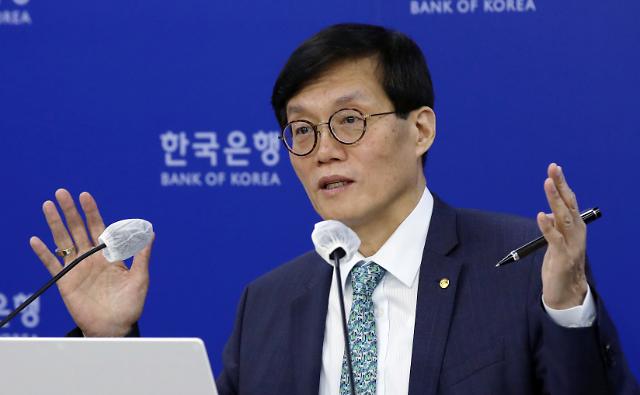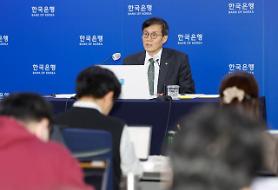
Bank of Korea (BOK) Governor Rhee Chang-yong answers questions from reporters at the BOK building in central Seoul, February 23, after the central bank decided to freeze its key interest rate at 3.5 percent. [Yonhap]
The central made the decision on February 23 after holding a Monetary Policy Board meeting. The rate freeze came as the South Korean economy continues to slow down after it began to contract in the fourth quarter of last year amid sluggish exports and sagging domestic demand.
Leaving the rate unchanged at the current level is seen as a move by the Bank of Korea (BOK) not to weaken consumption and investment further although consumer prices remained at the 5 percent level for the ninth straight month in January.
In May 2020 after the outbreak of the COVID-19 pandemic, the BOK cut its rate to a record low of 0.5 percent. However, the central had continued to raise the rate for the past 17 months to move toward monetary tightening and fight inflation.
BOK Governor Rhee Chang-yong said that the rate freeze was made after taking into account growing uncertainties about the economic situation. He added that if consumer prices will go down to the 4 percent level in March and around 3 percent later this year, there will be no need for an additional rate hike and further monetary tightening.
However, he made it clear that the rate freeze was not intended to stimulate the economy at the sacrifice of price stability. He said the BOK needs to closely watch the future course of inflation to decide whether to raise the interest rate. He stressed that the prime task of the central bank is to ensure price stability.
Rhee also said the freeze should not necessarily be construed as signaling an end to monetary tightening. Five of the seven monetary board members also opened the possibility of the BOK raising its key rate by 25 basis points to 3.75 percent down the road.
Thus, the BOK is likely to hike its key rate if the U.S. continues to raise its interest rate to tame inflation, or Korea's inflation rate does not fall below 5 percent in the aftermath of soaring utility charges.
Korea's benchmark interest rate is far lower than the U.S. rate of between 4.50 percent and 4.75 percent. If the Federal Reserve makes a further hike, the BOK might follow suit on fears of a weaker Korean currency and ensuing capital flight from Korea.
The BOK revised down its 2023 economic growth outlook to 1.6 percent from its earlier projection of 1.7 percent on the back of contracting exports and sluggish consumption.
Pessimism persists over the outlook as some economists predict that the economic downturn will continue in the first quarter of this year after the economy contracted 0.4 percent in the fourth quarter of last year.
Copyright ⓒ Aju Press All rights reserved.


